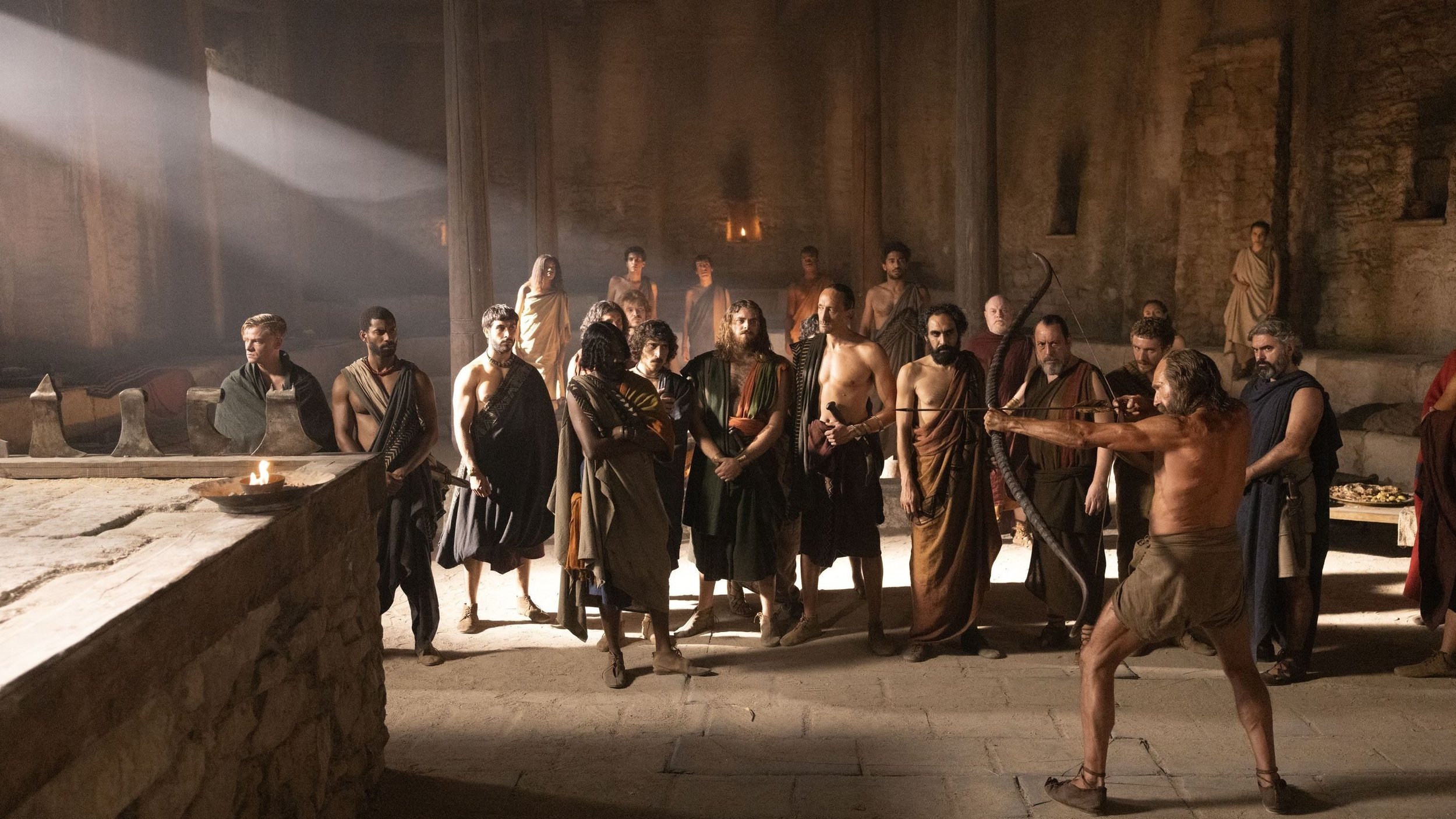The Return
/Ralph Fiennes strings Odysseus’s bow in The Return
Last night I finally had a chance to watch The Return, last year’s film adaptation of the climactic second half of the Odyssey. After anticipating it eagerly for some months, and more so as a steady drip of information about Christopher Nolan’s forthcoming Odyssey epic for IMAX has begun, I was underwhelmed.
First, the good. Ralph Fiennes is an excellent choice to play Odysseus and got into gnarly physical shape for the part. He looks every bit the weathered and toughened old warrior-king, and when he first opens his eyes on the beach at Ithaca they shine with sharply focused intelligence.
And, to be honest, that’s about it. There are a few nice touches I want to come back to, but the best I can say of The Return is that Fiennes performs excellently at the center of a movie that doesn’t measure up to what he’s doing.
I had two big problems with the film. The first is that, from production design and costuming to tone, the film is relentlessly dull and bleak. In the first two areas this bleakness betrays a depressing unoriginality and inauthenticity: inauthentic because this is not what Homer’s or Odysseus’s world looked like, unoriginal because The Return offers the same coarse, dingy, brown-on-brown vision of past peoples as primitives that was already old when Monty Python and the Holy Grail spoofed it.
The Return reminded me of Franco Zefirelli’s Hamlet in that it makes token nods toward a popular misconception of what a period is like—rough wool clothing in impractical designs, rickety dwellings made of sticks, cavernous stone palaces—while using flagrantly anachronistic elements—medieval castles in both cases—to create atmosphere. This could be forgiveable. Indeed, I love Zeferelli’s Hamlet. There will probably never be a movie that gives us a realistic look at the Bronze Age world Homer describes, but at least try to come up with something other than a stereotype.
The bleakness of the film’s tone is the bigger problem. Homer is serious when he needs to be, and presents the stakes—for Odysseus, for Penelope, for Telemachus, even for the suitors—seriously, but is never dour. The Return is simply dour. The film has no comic relief, no joy, no gratitude, no fond reminiscence or hope for the future. There is not even an Athena to pity or help or intercede for Odysseus. The Return is not just demythologized, it’s dehumanized.
This tonal problem is rooted in the film’s approach to the source material. The screenwriters have used the Odyssey to dramatize and explore modern pathologies. This is most evident in the case of Odysseus’s two most important allies upon his return, Eumaeus the swineherd and Telemachus, Odysseus’s son. In the film, both of them hate Odysseus for leaving for Troy and tell him so. They help him grudgingly. When he finally reveals himself and kills the suitors, Penelope reacts in horror and intervenes to spare Antinous, one of the ringleaders, whom Telemachus kills anyway. Penelope turns on them both, berating Odysseus for turning their hall into “a slaughterhouse” and leading Telemachus into a life of violence.
At this point, by replacing Homer’s characters with modern people, the story becomes absurd. What did you think was going to happen when Odysseus came back, lady? When Telemachus hesitated to give Odysseus his bow in the first place, why did you tell him to do so? Why did you bother to delay the suitors at all?
Then, in their long-anticipated reunion, Odysseus tells Penelope that he took so long to come home because he was ashamed of what he had become during the war. At this point all clicks into place: he’s been traumatized you see. Everyone in The Return is dealing with trauma. Trauma, trauma, trauma, just like a bunch of suburbanites moping their way through life. In place of Homer’s lost world of custom, loyalty, duty, ritual, and protocol, a world in which there is still room for love between father and son and tenderness between a well-matched husband and wife, The Return gives us angst and resentment.
It’s strange to me that the film finally squandered what goodwill I still had toward it during the climax, the well-staged slaying of the suitors. But I suppose it was there that the film shows its hand and I realized how far from Homer this story has wandered.
And yet a few glimpses of Homer shine through. When Odysseus poses as a beggar and is beaten and mistreated by the suitors, I felt an outrage true to the poem. When Eurycleia, Odysseus’s elderly nurse, recognizes him from a scar on his leg and is overpowered by excitement that he has returned, I felt that excitement, too. And, most poignantly of all, Odysseus’s encounter with his dying hunting dog Argos, abandoned outside the palace and the first creature on Ithaca to recognize his master, makes it into the movie. This simple, wordless scene moved me to tears.
If I’m being harsh it’s because I’m disappointed. I’m grateful to see an attempt to treat this story seriously, but grieved that the original wasn’t apparently good enough for the filmmakers. That the most emotionally powerful moments in the film were those lifted from the Odyssey with the least alteration or meddling makes The Return a useful warning against trying to improve on the classics.
I suspect it’s already too late for Nolan to learn the lesson. We’ll see next summer. In the meantime, I plan to reread Homer.





